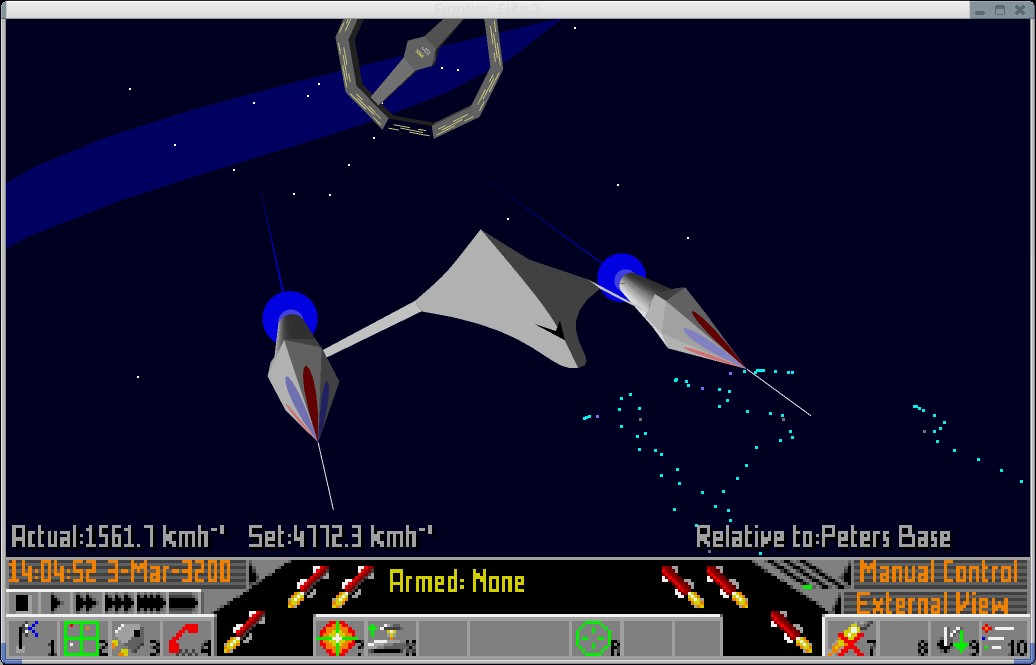Easy68k
I know this is a little weird to follow, but I thought it was somewhat interesting. Anyways I’ve been reading up on some CP/M stuff, and found some interesting m68k stuff. There is this really cool m68k simulator/test environment called easy68k. Ok so the 68000 isn’t exactly the hottest chip, but for anyone that’s used a Mac, Amiga, Atari ST, SEGA Genesis, or old SUN the m68000 was the end all be all CPU. Anyways you can download the easy68k simulator from here:
http://www.easy68k.com/
Now I’ve never been really all that good with assembly. I know one day I should learn, but until then, there is higher level languages, and of course the best ‘medium’ level language C. Back in the day the ‘sozobon’ compiler was somewhat portable, and a good & easy 16 bit C compiler. Now as far as I know there really hasn’t been any activity on this since 1991, so it’s getting hard to find, and of course the archived copies I found needed LZH.. You can find some archived copies here:
http://umich.edu/~archive/atari/Languages/Sozo2/
Since I didn’t want to go thru a big ordeal, I found an extracted copy of the sources here:
http://cd.textfiles.com/crawlycrypt1/program/compiler/sozobon/
Building the sozobon compiler
Using wget I pulled down the source code. It’s worth noting that unlike GCC this is SMALL… although it only targets the 68000 cpu. The only source that I’m using is the actual C compiler. I suppose if I were better I could map the simulator, and setup the assembler & linker to target the environment all the way… However for now I’m just interested in showing the relationship between a compiler, to the assembler. Now the source is old enough that it uses the reserved word inline in gunk.c I simply changed it to Xinline. I’ve attached a diff for those who like diff’s however as you can see it’s really simple, I just renamed them, so they don’t conflict.
--- gunk.c Fri Feb 22 05:33:34 1991
+++ gunk-fix.c Mon Mar 9 14:35:33 2009
@@ -37,7 +37,7 @@
int (rewri)(); / rewrite function */
};
-int m_unfold(), unfold(), m_cast(), cast(), m_inline(), inline();
+int m_unfold(), unfold(), m_cast(), cast(), m_inline(), Xinline();
int m_hardas(), hardas(), m_fcmp(), fcmp(), m_md_shf(), md_shf();
int m_eident(), eident(), m_incdec(), incdec(), m_fldas(), fldas();
@@ -48,7 +48,7 @@
{m_eident, eident},
{m_incdec, incdec},
{m_hardas, hardas},
- {m_inline, inline}, /* must cast before inline /
+ {m_inline, Xinline}, / must cast before inline */
{m_fcmp, fcmp},
{m_fldas, fldas},
{0}
@@ -424,7 +424,7 @@
return 0;
}
-inline(np)
+Xinline(np)
NODEP np;
{
register NODEP nmp, cmap;
@@ -782,7 +782,7 @@
register NODEP tp;
spar1 = "%fpcmp";
- inline(np);
+ Xinline(np);
tp = copyone(np);
tp->n_left = np->n_left;
Now with that out of the way, you should be able to build with the make.unx
% make -f make.unx
gcc -DUNIX -O -c d2.c
gcc -DUNIX -O -c decl.c
gcc -DUNIX -O -c expr.c
gcc -DUNIX -O -c fix.c
gcc -DUNIX -O -c fun.c
gcc -DUNIX -O -c g2.c
gcc -DUNIX -O -c gen.c
gcc -DUNIX -O -c gsub.c
gcc -DUNIX -O -c gunk.c
gcc -DUNIX -O -c main.c
main.c:424: warning: 'optnl' was declared implicitly 'extern' and later 'static'
main.c:417: warning: previous declaration of 'optnl'
gcc -DUNIX -O -c md.c
gcc -DUNIX -O -c nodes.c
gcc -DUNIX -O -c out_st.c
gcc -DUNIX -O -c p2.c
gcc -DUNIX -O -c pre.c
gcc -DUNIX -O -c tok.c
gcc -DUNIX -O -c subs_c.c
gcc -o xhcc d2.o decl.o expr.o fix.o fun.o g2.o gen.o gsub.o gunk.o main.o md.o nodes.o out_st.o p2.o pre.o tok.o subs_c.o
Writing hello world!
OK, with the compiler built, let’s write a simple C program. I’ve setup a simple main, and calls to a ‘putc’ and an ‘exit’ that currently don’t do anything. We will have to fix that in the assembly source.. but for now it’s nice as it sets up a place holder.
char MESSAGE[]="this is a message";
void putc(c)
char *c;
{
}
void exit()
{}
void main()
{
int j;
j=0;
putc(MESSAGE);
exit();
}
Now we can compile the source file (x.c) and use the -S flag, so it only outputs an assembly source, that we can then massage to work with easy68k.
% ./xhcc -S x.c ; cat x.s
.data
.globl _MESSAGE
_MESSAGE:
.dc.b $74,$68,$69,$73,$20,$69,$73,$20,$61,$20,$6d
.dc.b $65,$73,$73,$61,$67,$65
.dc.b 0
.text
.globl _putc
_putc:
bra L1
L0:
;var 4 8 _c
L2:
unlk a6
rts
L1:
link a6,#-0
bra L0
.globl _exit
_exit:
bra L4
L3:
L5:
unlk a6
rts
L4:
link a6,#-0
bra L3
.globl _main
_main:
bra L7
L6:
;var 2 -2 _j
clr.w -2(a6)
move.l #_MESSAGE,-(sp)
jsr _putc
add.w #4,sp
jsr _exit
L8:
unlk a6
rts
L7:
link a6,#-2
bra L6
.data
As you can see from the source below the following changes were made:
-Added the ORG $1000
-Changed the formatting of the _MESSAGE into a format that easy68k’s assembler likes.
-Removed all the .globl statements.
-Renamed the _main section to START & and add the end start tags.
-Populated the exit procedure with the ‘exit’ code from easy68k’s example
-Changed putc to use the d0 register instead of d6, and added the print string code from easy68k.
ORG $1000
_MESSAGE dc.b $74,$68,$69,$73,$20,$69,$73,$20,$61,$20,$6d
dc.b $65,$73,$73,$61,$67,$65
dc.b 0
_putc:
bra L1
L0:
;var 4 8 _c
move.b #14,d0
trap #15
L2:
unlk a0
rts
L1:
link a0,#-0
bra L0
_exit:
bra L4
L3:
L5:
unlk a6
rts
L4:
move.b #9,d0
trap #15
link a6,#-0
bra L3
START:
bra L7
L6:
;var 2 -2 _j
clr.w -2(a6)
move.l #_MESSAGE,-(sp)
jsr _putc
add.w #4,sp
jsr _exit
L8:
unlk a6
rts
L7:
link a6,#-2
bra L6
end start
conclusion
Now you can run the code in the simulator, and watch it enter the ‘start’ section, call the putc with the address of _MESSAGE, return to the main, and then call the _exit procedure, which calls the sim68k exit program interrupt. I’ll leave this as an exercise to the read for any real value…. I just thought it was cool, that without really learning any assembly I was able to write a basic ‘hello world’ type program in an hour….



